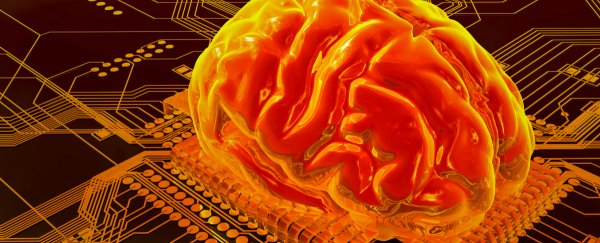Scientists have built a tiny, long-term memory cell that can both store and process information at the same time, just like the human brain. This is one of the first multi-state electronic memory cells, and it represents a crucial step towards building a bionic brain.
Not only does this new cell - which is 10,000 times thinner than a human hair - open up the potential to store and process way more data than ever before, scientists are even more excited about the fact that it has 'memristive' abilities. This means that it's able to retain remember and be influenced by information that has previously been stored on it - something that our current storage devices aren't capable of.
"This is the closest we have come to creating a brain-like system with memory that learns and stores analog information and is quick at retrieving this stored information," project leader Sharath Sriram, from RMIT University in Australia said in a press release. "The human brain is an extremely complex analog computer … its evolution is based on its previous experiences, and up until now this functionality has not been able to be adequately reproduced with digital technology."
The cell's new abilities add another dimension beyond the on/off memory cells we currently use to store our data on conventional devices, such as USBs, which are only capable of storing one binary digit (either a 0 or a 1) at a time. The researchers are comparing this to the difference between a regular light switch, which either turns the light on or off, and a dimmer switch, which gives you access to all the shades of light in-between.
"It can give you much more flexibility in terms of what information you store and what functionality you get," one of the researchers, Hussein Nili, told Jessica Kidd over at ABC News.
Publishing in Advanced Functional Materials, the researchers explain that the cells are made out of a functional oxide material in the form of an ultra-thin film. The team created the material last year, and demonstrated that it was highly stable and reliable. But they've now successfully introduced controlled defects into the film, which allow the cell to be influenced by previous events.
"We have now introduced controlled faults or defects in the oxide material along with the addition of metallic atoms, which unleashes the full potential of the 'memristive' effect - where the memory element's behaviour is dependent on its past experiences," Nili explained in the release.
All this means that the cells could one day be used to build an artificial system that mimics the extraordinary abilities of the human brain, which is extremely fast, requires very little energy input, and has almost limitless memory storage. While the benefits to artificial intelligence and computing are obvious, such a 'bionic brain' could also greatly help human health by allowing researchers to create and study diseases such as Alzheimer's and Parkinson's outside of the body.
"In terms of those diseases, there are two problems: it is very hard to read what is going on inside a live brain, and the ethical aspect - you cannot experiment on live subjects without repercussions," Nili told Ariel Bogle from Mashable. "If you can have a bionic brain and you can replicate those kinds of [diseased] brains … it will make research much easier and accessible."
We're pretty excited to see what these little cells can do.
